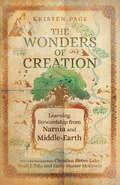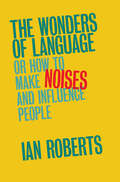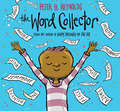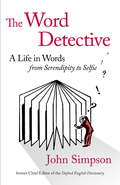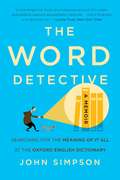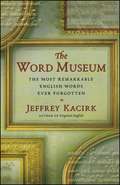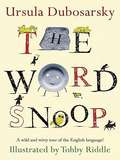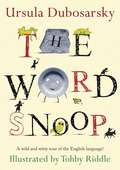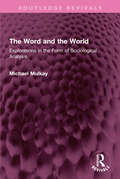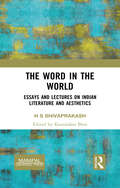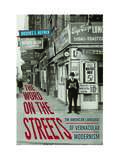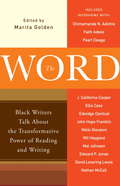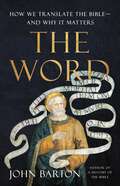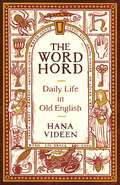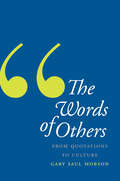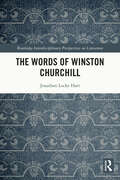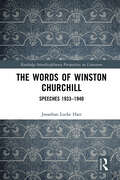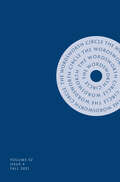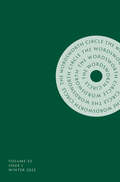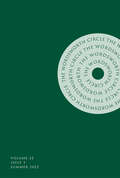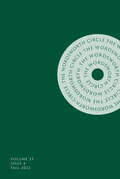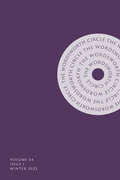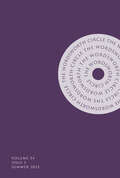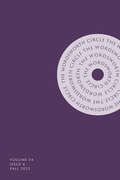- Table View
- List View
The Wonders of Creation: Learning Stewardship from Narnia and Middle-Earth (Hansen Lectureship Series)
by Kristen PageWhen an author of fiction employs the imagination and sets characters in a new location, they are in a sense creating a world. Might such fictional worlds give us a deeper appreciation for our own?Many readers have found themselves, like the Pevensie children, transported by C. S. Lewis into Narnia, and they have traveled from Lantern Waste to Cair Paravel and the edge of the sea. Thanks to J. R. R. Tolkien, readers have also journeyed with Bilbo, Frodo, and their companions across Middle-earth from the Shire to the Lonely Mountain, the forest of Mirkwood, the mines of Moria, and the very fires of Mount Doom. But as often as we enter these fictional worlds as readers, we eventually return to our world refreshed with sharpened insight.The Wonders of CreationBased on the annual lecture series hosted at Wheaton College's Marion E. Wade Center, volumes in the Hansen Lectureship Series reflect on the imaginative work and lasting influence of seven British authors: Owen Barfield, G. K. Chesterton, C. S. Lewis, George MacDonald, Dorothy L. Sayers, J. R. R. Tolkien, and Charles Williams.
The Wonders of Language
by Ian RobertsIan Roberts offers a stimulating introduction to our greatest gift as a species: our capacity for articulate language. We are mostly as blissfully unaware of the intricacies of the structure of language as fish are of the water they swim in. We live in a mental ocean of nouns, verbs, quantifiers, morphemes, vowels and other rich, strange and deeply fascinating linguistic objects. This book introduces the reader to this amazing world. Offering a thought-provoking and accessible introduction to the main discoveries and theories about language, the book is aimed at general readers and undergraduates who are curious about linguistics and language. Written in a lively and direct style, technical terms are carefully introduced and explained and the book includes a full glossary. The book covers all the central areas of linguistics, including phonetics, phonology, morphology, syntax, semantics and pragmatics, as well as historical linguistics, sociolinguistics and psycholinguistics.
The Word Collector
by Peter H. ReynoldsFrom the beloved bestselling creator of The Dot and our own Happy Dreamer comes an inspiring story about the transformative and profound power of words.Some people collect stamps.Some people collect coins.Some people collect art.And Jerome?Jerome collected words . . . In this extraordinary new tale from Peter H. Reynolds, Jerome discovers the magic of the words all around him -- short and sweet words, two-syllable treats, and multisyllable words that sound like little songs. Words that connect, transform, and empower. From the creator of The Dot and Happy Dreamer comes a celebration of finding your own words -- and the impact you can have when you share them with the world.
The Word Detective: A Life in Words: From Serendipity to Selfie
by John SimpsonLanguage is always changing. No one knows where it is going but the best way to future-cast is to look at the past. John Simpson animates for us a tradition of researching and editing, showing us both the technical lexicography needed to understand a word, and the careful poetry needed to construct its definition. He challenges both the idea that dictionaries are definitive, and the notion that language is falling apart. With a sense of humour, an ability to laugh at bureaucracy and an inclination to question the status quo, John Simpson gives life to the colourful characters at the OED and to the English language itself. He splices his stories with entertaining and erudite diversions into the history and origin of words such as 'kangaroo', 'hot-dog' , 'pommie', 'bicycle' , not ignoring those swearwords often classed as 'Anglo-Saxon' ! The book will speak to anyone who uses a dictionary, 'word people' , history lovers, students and parents.
The Word Detective: Searching for the Meaning of It All at the Oxford English Dictionary
by John Simpson"A charmingly full, frank, and humorous account of a career dedicated to rigorous lexicographic rectitude. . . . He is an absolute hero."-Lynne Truss, New York TimesCan you drink a glass of balderdash? And what do you call the part of a dog's back it can't scratch? The answers to these questions can be found in the Oxford English Dictionary. There is no better guide to the dictionary's many wonderments than its former chief editor, John Simpson. In The Word Detective, an intensely personal memoir and a joyful celebration of English, he weaves a story of how words come into being, how culture shapes language, and how technology transforms words. A brilliant and deeply humane expedition through the world of words, The Word Detective will delight and inspire any lover of language.
The Word Museum
by Jeffrey KacirkENTER A GALLERY OF WIT AND WHIMSY As the largest and most dynamic collection of words ever assembled, the English language continues to expand. But as hundreds of new words are added annually, older ones are sacrificed. Now from the author of Forgotten English comes a collection of fascinating archaic words and phrases, providing an enticing glimpse into the past. With beguiling period illustrations, The Word Museum offers up the marvelous oddities and peculiar enchantments of old and unusual words.
The Word Snoop
by Ursula Dubosarsky Tohby RiddleMeet the Word Snoop. She?s dashing and daring and witty as can be?and no one knows more about the evolution of the English language than she does. Luckily, she?s spilling her secrets in this gem of a book. From the first alphabet in 4000 BC, to anagrams, palindromes, and modern-day text messages, readers will learn all about the fascinating twists and turns our fair language has taken to become what it is today. With playful black-and-white illustrations, riddles to solve, and codes to break, The Word Snoop is definitive proof that words can spark the imagination and are anything but dull. This is a book for every aspiring writer, and every true reader.
The Word Snoop
by Ursula DubosarskyMeet the Word Snoop. She's dashing and daring and witty as can be -- and no one knows more about the evolution of the English language than she does. Luckily, she's spilling her secrets in this gem of a book. From the first alphabet in 4000 BC, to anagrams, palindromes, and modern-day text messages, readers will learn all about the fascinating twists and turns our fair language has taken to become what it is today. With playful black-and-white illustrations, riddles to solve, and codes to break, The Word Snoop is definitive proof that words can spark the imagination and are anything but dull. This is a book for every aspiring writer, and every true reader.
The Word and the World: Explorations in the Form of Sociological Analysis (Routledge Revivals)
by Michael MulkayFirst published in 1985, The Word and the World is a significant, empirically-based contribution to the sociological analysis of scientists’ discourse and scientific culture. It also offers a radical departure from established forms of sociological discourse which has far-reaching implications for all areas of sociological study. The central aim of this book is to widen the range of textual forms used in empirical sociological research, and thereby to increase sociologists’ ability to furnish interesting, valid and practically useful conclusions. The unusual textual forms employed for the purposes of sociological analysis are ‘the play’, ‘the investigative inquiry’, ‘the participant-analyst dialogue’, and ‘the parody’. One of the main substantive topics that provides the material for these explorations in form is the ‘scientific debate’. This book will be of interest to students of sociology, rhetoric, linguistics and science.
The Word in the World: Essays and Lectures on Indian Literature and Aesthetics
by H S ShivaprakashThe Word in the World is a collection of essays and lectures by H S Shivaprakash, a well-known poet, playwright, and translator. Edited by Kamalakar Bhat, this book brings together Prof Shivaprakash’s interventions in the realm of issues that are entwined with the continuities and discontinuities in the cultural negotiations of India. Distinctively, these are essays on subjects ranging from the nature and significance of medieval works of literature in India to issues arising out of developments in Indian aesthetics. The unfeigned magnitude of this work must be found among students and scholars, who will gain from it a perspective significantly different from the ones available in the prevailing academic discourses, thus indicating a way beyond poststructuralist/postmodernist frameworks. This is a book that will interest a wide variety of readers with its engaging insights and breadth of reference especially because it is written in a comprehensible style. Print edition not for sale in South Asia (India, Sri Lanka, Nepal, Bangladesh, Pakistan and Bhutan)
The Word on the Streets: The American Language of Vernacular Modernism
by Brooks E. HefnerFrom the hard-boiled detective stories of Dashiell Hammett to the novels of Claude McKay, The Word on the Streets examines a group of writers whose experimentation with the vernacular argues for a rethinking of American modernism—one that cuts across traditional boundaries of class, race, and ethnicity.The dawn of the modernist era witnessed a transformation of popular writing that demonstrated an experimental practice rooted in the language of the streets. Emerging alongside more recognized strands of literary modernism, the vernacular modernism these writers exhibited lays bare the aesthetic experiments inherent in American working-class and ethnic language, forging an alternative pathway for American modernist practice.Brooks Hefner shows how writers across a variety of popular genres—from Gertrude Stein and William Faulkner to humorist Anita Loos and ethnic memoirist Anzia Yezierska—employed street slang to mount their own critique of genteel realism and its classist emphasis on dialect hierarchies, the result of which was a form of American experimental writing that resonated powerfully across the American cultural landscape of the 1910s and 1920s.
The Word: Black Writers Talk About the Transformative Power of Reading and Writing
by Marita GoldenCritically acclaimed Black writers reveal how books have shaped their personal lives--in often unexpected ways. In these thirteen strikingly candid interviews, bestselling authors, winners of the Pulitzer Prize, and writers picked by Oprah's Book Club discuss how the acts of reading and writing have deeply affected their lives by expanding the conceptual borders of their communities and broadening their sense of self. Edwidge Danticat movingly recounts the first time she encountered a Black character in a book and how this changed her worldview forever; Edward P. Jones speaks openly about being raised by an illiterate mother; J. California Cooper discusses the spiritual sources of her literary inspiration; Nathan McCall explains how reading saved his life while in prison; Pearl Cleage muses eloquently about how other people's stories help one make one's own way in the world; and world-renowned historian John Hope Franklin--in one of the last interviews he gave before his death--touchingly recalls his childhood in the segregated South and how reading opened his mind to life's greater possibilities. The stories that emerge from these in-depth interviews not only provide an important record of the creative life of leading Black writers but also explore the vast cultural and spiritual benefits of reading and writing, and they support the growing initiative to encourage people to read as both a passion and a pastime.
The Word: How We Translate the Bible—and Why It Matters
by John BartonFrom a distinguished Oxford scholar and the author of A History of the Bible, an examination of how biblical translation works and why it matters Throughout history, most Jewish and Christian believers have understood scripture not in the languages in which it was first written but rather in their own—in translation. In The Word, acclaimed Bible scholar John Barton explores how saints and scholars have negotiated the profound challenges of translating the Bible while remaining faithful to the original. In addition to considering questions of literal versus free translation, literary style, inclusive language, and more, Barton draws out scriptural translation&’s role at critical junctures in religious history. Far from a mere academic exercise, biblical translation has shaped how we answer faith&’s most enduring questions about the nature of God, the existence of the soul, and the possibility of salvation.
The Wordhord: Daily Life in Old English
by Hana VideenAn entertaining and illuminating collection of weird, wonderful, and downright baffling words from the origins of English—and what they reveal about the lives of the earliest English speakersOld English is the language you think you know until you actually hear or see it. Unlike Shakespearean English or even Chaucer’s Middle English, Old English—the language of Beowulf—defies comprehension by untrained modern readers. Used throughout much of Britain more than a thousand years ago, it is rich with words that haven’t changed (like word), others that are unrecognizable (such as neorxnawang, or paradise), and some that are mystifying even in translation (gafol-fisc, or tax-fish). In this delightful book, Hana Videen gathers a glorious trove of these gems and uses them to illuminate the lives of the earliest English speakers. We discover a world where choking on a bit of bread might prove your guilt, where fiend-ship was as likely as friendship, and where you might grow up to be a laughter-smith.The Wordhord takes readers on a journey through Old English words and customs related to practical daily activities (eating, drinking, learning, working); relationships and entertainment; health and the body, mind, and soul; the natural world (animals, plants, and weather); locations and travel (the source of some of the most evocative words in Old English); mortality, religion, and fate; and the imagination and storytelling. Each chapter ends with its own “wordhord”—a list of its Old English terms, with definitions and pronunciations.Entertaining and enlightening, The Wordhord reveals the magical roots of the language you’re reading right now: you’ll never look at—or speak—English in the same way again.
The Words of Others
by Gary Saul MorsonIn this lively gambol through the history of quotations and quotation books, Gary Saul Morson traces our enduring fascination with the words of others. Ranging from the remote past to the present, he explores the formation, development, and significance of quotations, while exploring the "verbal museums" in which they have been collected and displayed--commonplace books, treasuries, and anthologies. In his trademark clear, witty, and provocative style, Morson invites readers to share his delight in the shortest literary genre. The author defines what makes a quote quotable, as well as the (unexpected) differences between quotation and misquotation. He describes how quotations form, transform, and may eventually become idioms. How much of language itself is the residue of former quotations? Weaving in hundreds of intriguing quotations, common and unusual, Morson explores how the words of others constitute essential elements in the formation of a culture and of the self within that culture. In so doing, he provides a demonstration of that very process, captured in the pages of this extraordinary new book.
The Words of Winston Churchill (Routledge Interdisciplinary Perspectives on Literature)
by Jonathan Locke HartThe Words of Winston Churchill, a study that ranges over the course of a rich, controversial and remarkable career, is about the power and art of his language as a writer and speaker. Churchill used words as the greatest of poets and orators do, and did so in Parliament and for the people, Britain and the empire, in war and peace, facing the changes in the world, and resisting Hitler and the Nazis. Drawing on the traditions of poetics, rhetoric and textual commentary, the study concentrates on Churchill’s writing and is sensitive to texts and contexts and to the archive. A central matter is Churchill speaking in Parliament and the reception of his speeches there for over six decades, although his work as a writer and a speaker outside the House of Commons is also important. Churchill speaks to the House, the people, Britain, the Empire, the Commonwealth and the world and, in crisis, defends freedom and democracy.
The Words of Winston Churchill: Speeches 1933-1940 (Routledge Interdisciplinary Perspectives on Literature)
by Jonathan Locke HartThis book focuses on a close analysis of selected speeches of Winston Churchill in the House of Commons and some of the responses from fellow MPs from 1933-1940 in peace and war, during the rise of Hitler, and concentrates on foreign affairs. The study will appeal to those interested in Churchill, freedom, tyranny, diplomacy, war and conflict, democracy, politics, the 1930s, the Second World War, Britain, the English-speaking world, Canada, the United States, the British Empire and Commonwealth, Europe, France, Asia, Germany, totalitarianism, Parliament and legislative assemblies, rhetoric, language, style, speech-writing, oral and written communication, literature, history and other areas. The debate between autocracy and the tyrannical totalitarian on the one hand and democracy on the other is the debate of those times and ours. The reader will find many parallels, some chilling, with our own times. Churchill and his contemporaries have much to teach us.Churchill was key to our world history and is a key to understanding what is at stake in the world now.
The Wordsworth Circle, volume 52 number 4 (Autumn 2021)
by The Wordsworth CircleThis is volume 52 issue 4 of The Wordsworth Circle. The Wordsworth Circle (TWC) is an international quarterly learned journal founded in 1970 to facilitate communications among colleagues interested in the lives, works, and times of British, American, and European writers from 1770 to 1850, before and after. TWC publishes original essays, conference papers, letters, editions, bibliographies, textual and historical scholarship, biography, interpretive criticism, and critical theory, as well as interdisciplinary, cultural, and comparative studies. It is concerned with anything that influenced, impinges upon, expresses, or contributes to an understanding of the writers, works, and events associated with Romantic studies and its after-lives.
The Wordsworth Circle, volume 53 number 1 (Winter 2022)
by The Wordsworth CircleThis is volume 53 issue 1 of The Wordsworth Circle. The Wordsworth Circle (TWC) is an international quarterly learned journal founded in 1970 to facilitate communications among colleagues interested in the lives, works, and times of British, American, and European writers from 1770 to 1850, before and after. TWC publishes original essays, conference papers, letters, editions, bibliographies, textual and historical scholarship, biography, interpretive criticism, and critical theory, as well as interdisciplinary, cultural, and comparative studies. It is concerned with anything that influenced, impinges upon, expresses, or contributes to an understanding of the writers, works, and events associated with Romantic studies and its after-lives.
The Wordsworth Circle, volume 53 number 2 (Spring 2022)
by The Wordsworth CircleThis is volume 53 issue 2 of The Wordsworth Circle. The Wordsworth Circle (TWC) is an international quarterly learned journal founded in 1970 to facilitate communications among colleagues interested in the lives, works, and times of British, American, and European writers from 1770 to 1850, before and after. TWC publishes original essays, conference papers, letters, editions, bibliographies, textual and historical scholarship, biography, interpretive criticism, and critical theory, as well as interdisciplinary, cultural, and comparative studies. It is concerned with anything that influenced, impinges upon, expresses, or contributes to an understanding of the writers, works, and events associated with Romantic studies and its after-lives.
The Wordsworth Circle, volume 53 number 3 (Summer 2022)
by The Wordsworth CircleThis is volume 53 issue 3 of The Wordsworth Circle. The Wordsworth Circle (TWC) is an international quarterly learned journal founded in 1970 to facilitate communications among colleagues interested in the lives, works, and times of British, American, and European writers from 1770 to 1850, before and after. TWC publishes original essays, conference papers, letters, editions, bibliographies, textual and historical scholarship, biography, interpretive criticism, and critical theory, as well as interdisciplinary, cultural, and comparative studies. It is concerned with anything that influenced, impinges upon, expresses, or contributes to an understanding of the writers, works, and events associated with Romantic studies and its after-lives.
The Wordsworth Circle, volume 53 number 4 (Autumn 2022)
by The Wordsworth CircleThis is volume 53 issue 4 of The Wordsworth Circle. The Wordsworth Circle (TWC) is an international quarterly learned journal founded in 1970 to facilitate communications among colleagues interested in the lives, works, and times of British, American, and European writers from 1770 to 1850, before and after. TWC publishes original essays, conference papers, letters, editions, bibliographies, textual and historical scholarship, biography, interpretive criticism, and critical theory, as well as interdisciplinary, cultural, and comparative studies. It is concerned with anything that influenced, impinges upon, expresses, or contributes to an understanding of the writers, works, and events associated with Romantic studies and its after-lives.
The Wordsworth Circle, volume 54 number 1 (Winter 2023)
by The Wordsworth CircleThis is volume 54 issue 1 of The Wordsworth Circle. The Wordsworth Circle (TWC) is an international quarterly learned journal founded in 1970 to facilitate communications among colleagues interested in the lives, works, and times of British, American, and European writers from 1770 to 1850, before and after. TWC publishes original essays, conference papers, letters, editions, bibliographies, textual and historical scholarship, biography, interpretive criticism, and critical theory, as well as interdisciplinary, cultural, and comparative studies. It is concerned with anything that influenced, impinges upon, expresses, or contributes to an understanding of the writers, works, and events associated with Romantic studies and its after-lives.
The Wordsworth Circle, volume 54 number 3 (Summer 2023)
by The Wordsworth CircleThis is volume 54 issue 3 of The Wordsworth Circle. The Wordsworth Circle (TWC) is an international quarterly learned journal founded in 1970 to facilitate communications among colleagues interested in the lives, works, and times of British, American, and European writers from 1770 to 1850, before and after. TWC publishes original essays, conference papers, letters, editions, bibliographies, textual and historical scholarship, biography, interpretive criticism, and critical theory, as well as interdisciplinary, cultural, and comparative studies. It is concerned with anything that influenced, impinges upon, expresses, or contributes to an understanding of the writers, works, and events associated with Romantic studies and its after-lives.
The Wordsworth Circle, volume 54 number 4 (Autumn 2023)
by The Wordsworth CircleThis is volume 54 issue 4 of The Wordsworth Circle. The Wordsworth Circle (TWC) is an international quarterly learned journal founded in 1970 to facilitate communications among colleagues interested in the lives, works, and times of British, American, and European writers from 1770 to 1850, before and after. TWC publishes original essays, conference papers, letters, editions, bibliographies, textual and historical scholarship, biography, interpretive criticism, and critical theory, as well as interdisciplinary, cultural, and comparative studies. It is concerned with anything that influenced, impinges upon, expresses, or contributes to an understanding of the writers, works, and events associated with Romantic studies and its after-lives.
